 The UEFA Women’s Championship final back in April 2022 was epic. Even for those of us mostly unmoved by the beautiful game, it was uplifting; it felt as if that match really turned things around. It started to seem like women’s football might finally be taken seriously. So many excited little girls and young women, seeing those players out there, many realising for the first time that it really was possible to shine in the arena of what had for over a century been seen as a man’s sport.
The UEFA Women’s Championship final back in April 2022 was epic. Even for those of us mostly unmoved by the beautiful game, it was uplifting; it felt as if that match really turned things around. It started to seem like women’s football might finally be taken seriously. So many excited little girls and young women, seeing those players out there, many realising for the first time that it really was possible to shine in the arena of what had for over a century been seen as a man’s sport.

Women’s football in Britain has a long and illustrious history, despite numerous and persistent attempts by men to thwart it.
“But surely not!” I hear you scoff, to which I reply “Hear me out.”
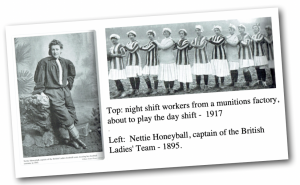
Captain of the British Ladies Football Club at the end of the 19th century was one ‘Nettie Honeyball‘ an intriguing and elusive character who should quite definitely have a film made about her. There were two major women’s teams at the time and not everyone was happy about it- the Archdeacon of Manchester professed it “a disgrace to the town (of Rochdale) that such an exhibition should be allowed to take place”.
In the early 20th century, people turned out in droves to watch women play football. Many factory workers had teams: the photo above shows the night shift of a munitions factory preparing to play the day shift.
In 1921 the Football Association banned women’s football from professional football grounds, and the grounds of any club affiliated with them. Their given reason was that “the game of football is quite unsuitable for females and ought not to be encouraged.”
The reality is that they were miffed because it had become so popular.
In his highly readable ‘Girls with Balls – The Secret History‘, Tim Tate writes:
“With the men away fighting from 1914 to 1918 most of the workers in the factories of northern England were women and many factories had a ladies’ football team…
By 1920, ladies’ football was a major spectator sport. But away from the cheering terraces the bastions of professional men’s football viewed the mass popularity of women’s soccer with increasing alarm. On the 5th of December 1921 the Football Association met in London. After a brief debate behind closed doors it unanimously passed an urgent resolution: women’s football was banned from all professional football grounds.”
The Football Association could, of course, have lifted the ban at any time but did not do so until 1971, fifty years later.
“My stepsister Marianne,” Lesley told me, “used to think she was a boy growing up, but she says, looking back, it was because she really, really wanted to play football.” Growing up in the late 50s (when gender dysphoria was a little known condition) Lesley’s step-sister moved to America where she eventually fulfilled her dream of playing high level women’s soccer. She is, incidentally, a lesbian, and under current conditions somebody somewhere- if not everybody everywhere- would have been applauding the idea that this rugged little girl might really be a boy, and egging her on because ‘trans children know who they are’.
So women could play on the great menz hallowed ground again in England at last, hurrah, but there was still much to contend with.
1970s
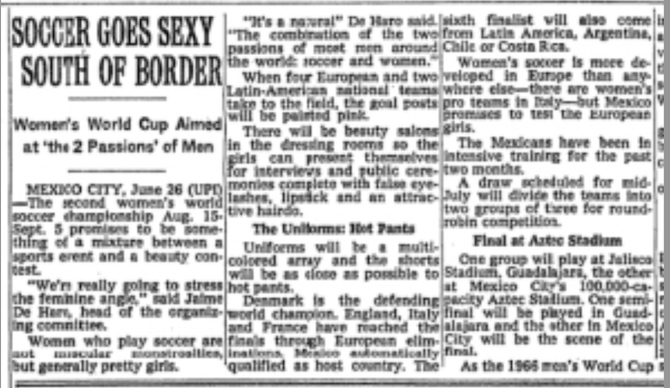 Let’s hop across the pond for a moment. In 1971 The New York Times reported “Soccer goes Sexy South of Border”. Denmark was the defending champion of the World Women’s Soccer Championship at the time, and teams from Italy, England and France (among others) had also made it through to the finals, which were held in Mexico.
Let’s hop across the pond for a moment. In 1971 The New York Times reported “Soccer goes Sexy South of Border”. Denmark was the defending champion of the World Women’s Soccer Championship at the time, and teams from Italy, England and France (among others) had also made it through to the finals, which were held in Mexico.
The Championship “promises to be something of a mixture between a sports event and a beauty contest,” reported the NYT. “There will be beauty salons in the dressing rooms so the girls can present themselves for interviews and public ceremonies, complete with false eyelashes, lipstick and attractive hairdos.” It went on to add that uniforms would a multi-coloured “and the shorts will be as close as possible to hot pants.”
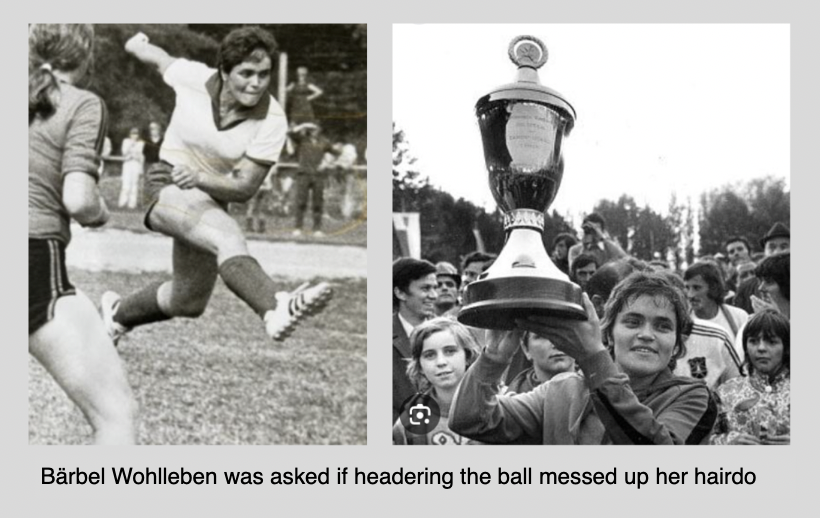 In 1974, when German football player Bärbel Wohlleben became the first woman to win the award “goal of the month”, a sports journalist asked her, “but when you header the ball, doesn’t it mess up your hair?”
In 1974, when German football player Bärbel Wohlleben became the first woman to win the award “goal of the month”, a sports journalist asked her, “but when you header the ball, doesn’t it mess up your hair?”
1980s
“I desperately wanted to be a boy just so I could be a footballer.” 1980s centre-forward Karen ‘Curly’ Rogers told Sue Austin of the Shropshire Star. Unable to play at her secondary school (girls played netball) aged 25 she joined Oswestry Ladies. The women’s team weren’t allowed to use the Oswestry Town pitch, they had to play on a pitch outside the Highwayman pub.
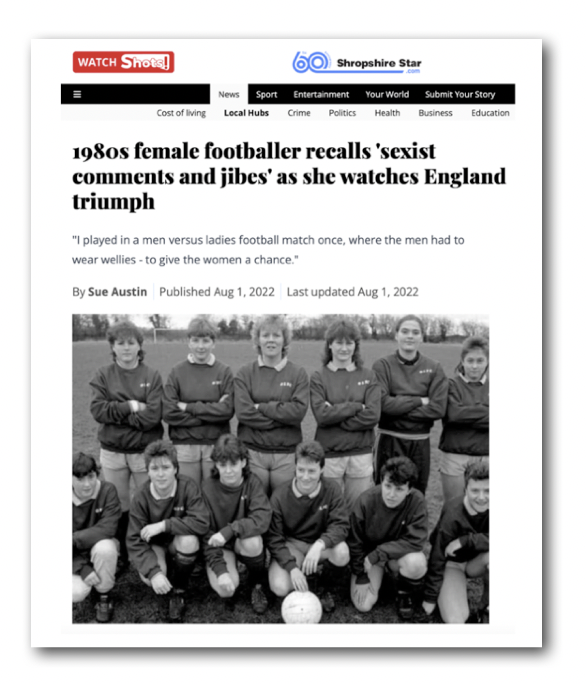 “The men from the pub used to come out with their pints to watch us, and take the mickey out of us,” reported Curly. “All we got were sexist remarks and jeers. And most of them couldn’t kick a ball if they tried.”
“The men from the pub used to come out with their pints to watch us, and take the mickey out of us,” reported Curly. “All we got were sexist remarks and jeers. And most of them couldn’t kick a ball if they tried.”
Later, Curly played for Welsh team, Pennant Ladies, and also managed her son’s team.
“The men involved and other managers would talk to me as if I didn’t have a clue. It still happens today if I dare to voice an opinion about a match ” she said in 2022.
1990s
Of playing football at Cambridge University in the 90s, Anna reflects that the women’s team had no contact with the men’s team, nor did they receive any football funding. Like Curly Rogers, ten years before her, Anna’s team was not allowed to play on the men’s ground, instead playing at St John ‘s Sportsground, with no stands or toilet facilities.
“There were no female role models, Anna told Abbie Hastie of Varsity. “There was just not an option. It just wasn’t a thing, like completely zero experience or knowledge of any woman’s football”.
In 2011, Rachel Dixon wrote in the Guardian about watching the Women’s World Cup Quarter final, between England and France, in her local pub. One drinker walked out in disgust when he saw it was women’s football, others expressed surprise. Comments from male drinkers included, “Ooo handbags” and the inevitable “that one’s fit!”
Well, what do we expect? This, unfortunately. We expect this.
Now
One might think things had improved in football for women after the Lionesses spectacular victory in 2022. Yet a Kick It Out report in 2023 revealed that “record number of discrimination complaints have been made for the most recent season, with the biggest rise in sexism and misogyny”.
Their survey of 115 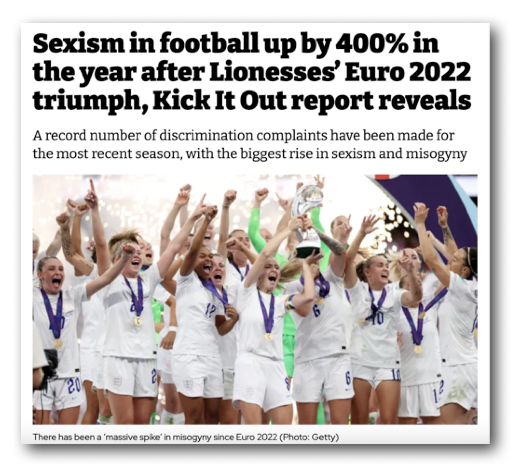 female coaches “found that 80% of women had experienced some form of sexism or misogyny while in a coaching environment. 70% had been subject to the same issues whilst on a coaching course.” Sexist comments from male colleagues and the parents of the students they coached led over half of them to have considered quitting.
female coaches “found that 80% of women had experienced some form of sexism or misogyny while in a coaching environment. 70% had been subject to the same issues whilst on a coaching course.” Sexist comments from male colleagues and the parents of the students they coached led over half of them to have considered quitting.
If you’re thinking, as I did, that the record number of complaints might have been because women were feeling more able to speak up, the report also noted that “71% of those who had experienced sexism or misogyny on a coaching course didn’t feel as though they could report it comfortably to the course leader.”
Popping over to Australia for a moment, in 2023 a Perth amateur football team noted they were being subject to online abuse on Facebook after a bad game.
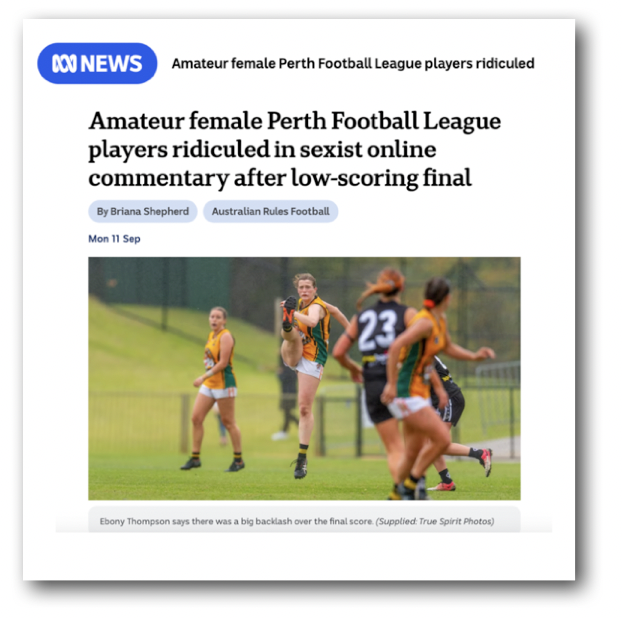 “There are over 1,000 comments on there now … a large majority of them are comments that are very derogatory, and sexist and generally just very poor form.”
“There are over 1,000 comments on there now … a large majority of them are comments that are very derogatory, and sexist and generally just very poor form.”
Ebony Thompson, who plays for Curtin Uni Wesley, noted that the most abusive comments followed a pattern.
“That would be men,” she said. “The people who were making these really disgusting comments… they’re all older men.”
We can stay in Australia & just hop forward a few months, over to Victoria.
“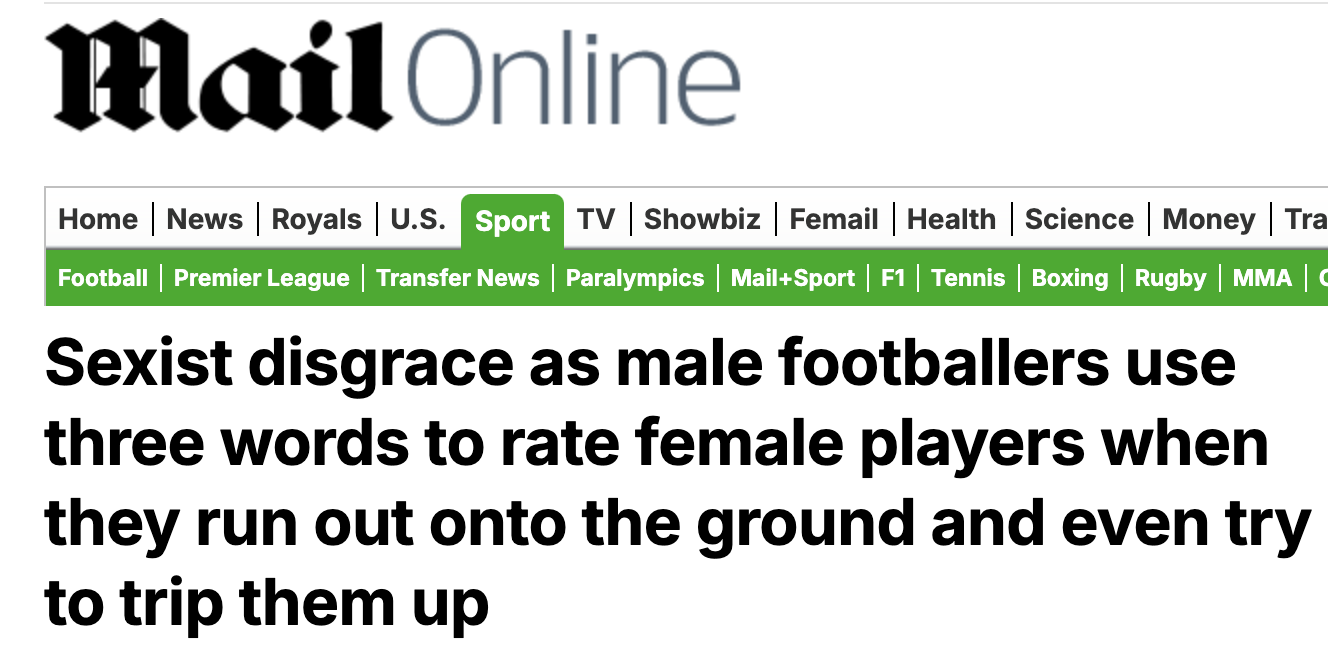 A Victorian football club has been forced to issue a public apology after male players used a shocking rating system on opposition female players and tried to trip them over as they ran out for a match.
A Victorian football club has been forced to issue a public apology after male players used a shocking rating system on opposition female players and tried to trip them over as they ran out for a match.
During a match between Knox and Donvale FC, ‘as the women ran out at half time, male players from Knox lined up on either side of the race, and yelled at ratings for each player.”
Jenni Hermoso
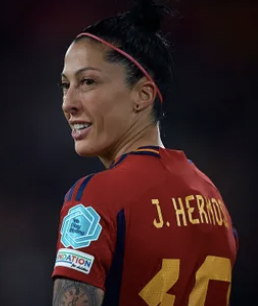
Jenni Hermoso
During the 2023 World Cup, Luis Rubiales was accused of sexual assault by Spanish player Jenni Hermoso after he grasped her face and kissed her on the lips after the Women’s World Cup Final. Rubiales insisted the kiss was consensual and later claimed he had been victim of a witch hunt by ‘false feminists’. CBS reported that Hermoso denied this kiss was consensual and “also said she and her family were pressured by the federation to show her support for Rubiales in the immediate aftermath of the scandal….”
Hermoso stood her ground.
Money
Just for starters, England Lionesses captain Leah Williamson is reported to have earned £200,000 in 2021. The men’s England Captain earns that much in a week. Leah Williamson, writing for the BBC, suggests men are “earning 100 times what the women do”.
“There’s one consolation: England players male or female are paid the same £2,000 match fee per game and have been since 2020.”
Women in men’s football
The women mentioned below consider themselves to be nonbinary, or men, and have taken hormones to make themselves appear more like men. They acknowledge that these hormones will have increased their physical strength, but that they are still not strong enough to play comfortably with men.
Jays, who played briefly on a men’s team after transitioning, told Lisa Lotons at Vice magazine ”I don’t really like men’s football, there’s a lot of aggression on the field, like people kicking each other’s ankles. And I didn’t feel physically strong enough to play with them – I was knocked over easily. After this experience, I didn’t play for a long time.”
Jays returned to women’s football but her application to play was rejected, not because non-binary is nonsense but presumably because of the hormones, as “my physical differences could supposedly affect the safety and performance of other female players”. Her coach and fellow team mates decided to ignore the edict and she plays on the women’s team anyway.
Another woman who took hormones reported, “I really wanted to play with men, because I feel 100 percent like a man. So I gave it a shot, but I quickly realised it was impossible. The physical difference is just too big. I’m stronger and I can handle more than I used to, but I still can’t compete with someone who was born as a man.”
So keeping all of this history of sexism and these testaments from women very much in mind, let’s change lane and have a look at a football match herd on a chilly evening in 2022.

 Dulwich Hamlet is a South London football club with a committed fan base and a navy blue and pink kit. Dulwich Hamlet has a men’s team and a women’s team and a 3,000 capacity stadium, with over 500 seats, on Champion Hill in the not-quite-so-posh bit of Dulwich. So they’re not Crystal Palace, but it’s fair to say that anyone who plays for DH is a pretty damn good at football. The club is know for the loyalty of its followers and in 2016 it received the Football Foundation Community Club Of The Year award. It often arranges friendly fundraisers.
Dulwich Hamlet is a South London football club with a committed fan base and a navy blue and pink kit. Dulwich Hamlet has a men’s team and a women’s team and a 3,000 capacity stadium, with over 500 seats, on Champion Hill in the not-quite-so-posh bit of Dulwich. So they’re not Crystal Palace, but it’s fair to say that anyone who plays for DH is a pretty damn good at football. The club is know for the loyalty of its followers and in 2016 it received the Football Foundation Community Club Of The Year award. It often arranges friendly fundraisers.
On Trans Day of Visibility 2022, Dulwich Hamlet Ladies took on a team from Trans Radio. It was a friendly match, a fundraiser for TransRadio, an historic moment no less, reported My London: the first time ‘a team made up entirely of transgender women play(ed) against a team of cisgender women’.
It was an historic moment for another, more disconcerting reason. Was this perhaps the first time that a women’s football team had been referred to as ‘a team of cisgender women’? Should Dulwich Hamlet Ladies now consider changing their name to Dulwich Hamlet Cisgender Ladies?
This is not a problem that will face Sutton Women, who now no longer even have the dubious luxury of calling themselves ‘a team of cisgender women’. But more on them in a moment.
My London claimed that the Trans Radio match ‘broke down the boundaries in place which often leaves (sic) transgender people on the sidelines of mainstream sport’. But did it? We decided to go and see for ourselves.
Size does matter
Looking through the photos of the game that appeared in the press, they seem to have been carefully selected to infer that the players on both teams were of similar sizes. This picture, taken by a friend at the start of the game, shows the size difference between the male and female players. Although the female players are standing in the foreground we can still see that their opponents are, without exception, taller and broader-shouldered.
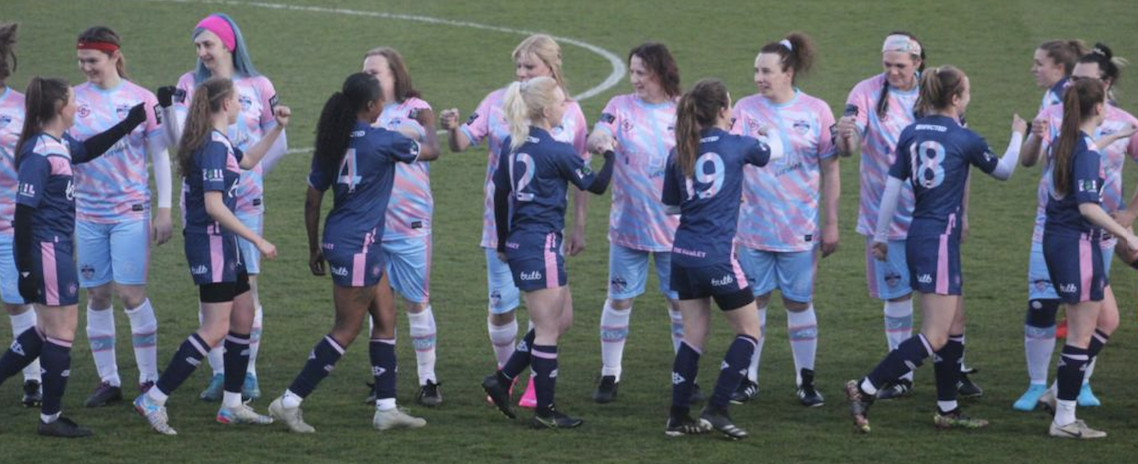
It’s just a bit of fun, what is it to you?
The men’s goalie at this match was six-footer Blair Hamilton, who had been recently selected to play for England Universities’ women’s side. He used to play blokes’ football but is clearly a woman now because his Twitter bio says “Get excited over little things like a new dishwasher!” followed by a cute little 😛 blob doing a head tilt.
He also writes academic papers explaining how it’s perfectly fair to put massive great blokes on women’s football teams, so that’s nice. As long as they get excited over dishwashers, I assume. I mean, obviously we have to draw a line somewhere.

This is the same Blair Hamilton, of course,now aged 34, who has this week been selected to play for Sutton ladies.
Hamilton, reports Oliver Brown in the Telegraph, “claims players who have gone through male puberty but identify as female are at a disadvantage compared to biological women”.
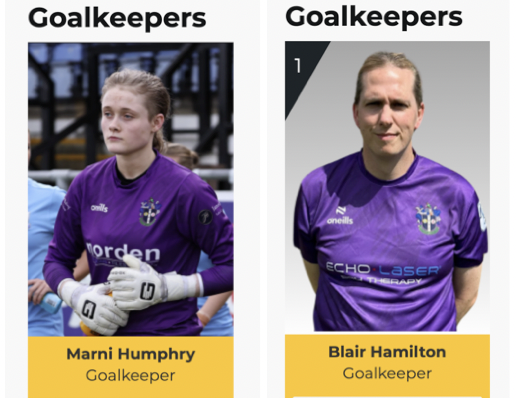 Blair replaces an actual woman, of course, goalkeeper Marni Humphry, who was featured on the team’s squad list until replaced by Hamilton. While it seems that Humphry was on loan from Fulham, one imagines that there might just have been another woman, somewhere, to take her place.
Blair replaces an actual woman, of course, goalkeeper Marni Humphry, who was featured on the team’s squad list until replaced by Hamilton. While it seems that Humphry was on loan from Fulham, one imagines that there might just have been another woman, somewhere, to take her place.
“So who put him there?” I hear you ask.
Well, none other than his old team mate from that same Trans Radio Dulwich football game (we’ll get back to it eventually) the lovely Lucy Clark, who was appointed to manage Sutton Women back in January 2024, causing JK Rowling to quip “When I was young all the football managers were straight, white, middle-aged blokes, so it’s fantastic to see how much things have changed”.
No other goalies available? Indeed not, according to Clark, who has deactivated his twitter account, but not before claiming he had been looking all summer but had been unable to find another goalkeeper.
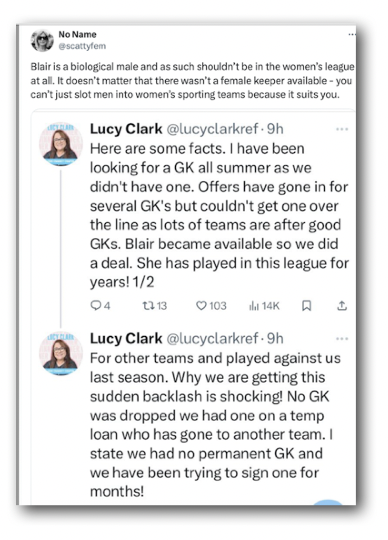
“Blair is a biological male and as such shouldn’t be in the women’s league at all. It doesn’t matter that there wasn’t a female keeper available – you can’t just slot men into women’s sporting teams because it suits you.” tweeted @scattyfem
But he was gone.
“Blair Hamilton, 34, has been recruited by Clark despite having previously drawn criticism from women’s rights groups for taking the place of a female goalkeeper.” reported Oliver Brown in the Telegraph. “Sharron Davies, the former Olympic silver medallist and long-standing advocate for fairness for women in sport, described Sutton’s move as “shameful”.
“Remember there is a human at the end of your abuse, on another day, they may not be able to take it,” Hamilton warns critics, elsewhere, who might be inclined to object to his LARPing.
In 2023, as part of LGBT History month, the BBC posted a video featuring Clark. It opens with the words:
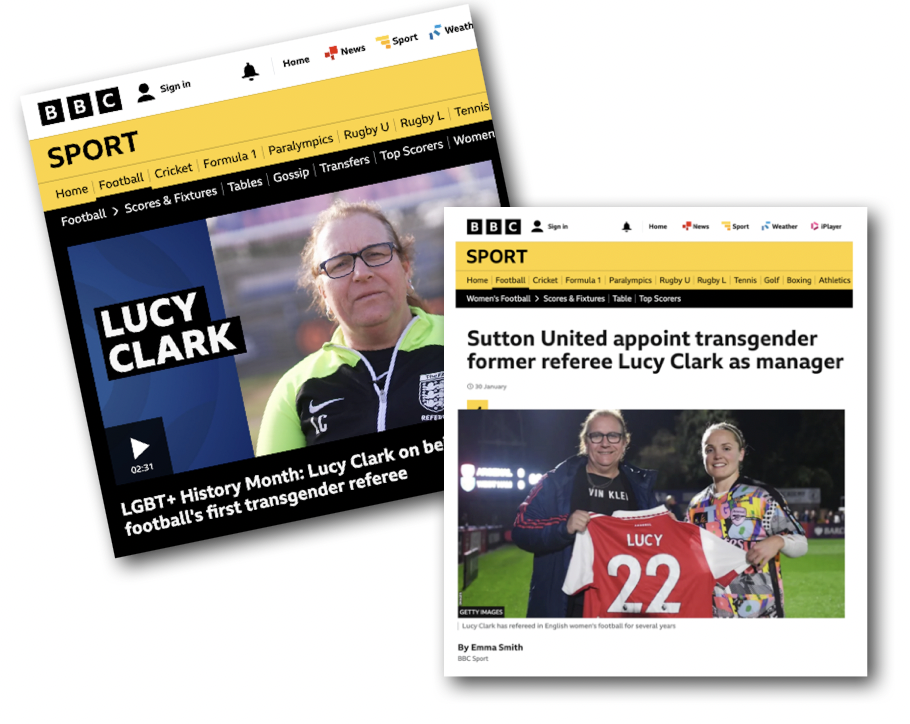 “I’m Lucy Clark and I’m the world’s first transgender referee. Football saved my life.”
“I’m Lucy Clark and I’m the world’s first transgender referee. Football saved my life.”
Clark then gives the camera a Paddington Hard Stare, as if to dare anyone to suggest otherwise.
After suffering multiple heart attacks Clark decided “I love football. Why should I give it up?” Later, in a glaring contradiction, he told London Scene in April 2024, “I never wanted it to be about me”.
But you did, mate. You wanted it to be ALL about you. And nobody suggested you should give up football. But as an ageing, overweight geezer, who’s suffered several heart attacks, maybe you should just face the fact that we can’t always get what we want. And taking things away from other people is mean spirited and nasty. And making it clear that you have a propensity for suicide ideation is both manipulative and controlling.
 I get that he really, really loves football and really, really wants to play with the women- that doesn’t mean it’s fair. It’s called women’s football for a reason.
I get that he really, really loves football and really, really wants to play with the women- that doesn’t mean it’s fair. It’s called women’s football for a reason.
And I get that he really wants to be a woman but he can call himself Lucy all he likes- that doesn’t mean it’s true.
And how does that affect me? Well, certainly I have no desire to play football. But I know little girls and young women who do.
In Brown’s piece in the Telegraph, he observes that, in 2022, Clark wrote on social media: “At some point we will field a team solely of trans women for the first time in history. How good is that?”
Which brings us back to the 2022 friendly footie match, which the women won 7-0. Some might use the result to suggest that it is harmless to include males on women’s teams. Remember, the males playing for TRUK were generally older and certainly far less fit than the women’s side, although several team members had played football at a decent level before transitioning, and some were already playing on women’s teams. My first assumption, that the match was played between a group of young, extremely fit young women and a group of mostly middle-aged, out-of-shape blokes sporting boobs, make-up and the odd wig and flower crown, was not quite as on point as I’d thought. Not quite.
I said it. Is that unkind? Well, it isn’t untrue. I watched these guys run around the pitch for however long it is a football game takes. I am also middle-aged and out of shape. Life throws us these curve balls. I would have lasted about five minutes running up and down that pitch, and would likely have collapsed into a lardy, sweaty and unpalatable heap long before half time. The boys did well. And here are some of my photos from the match.
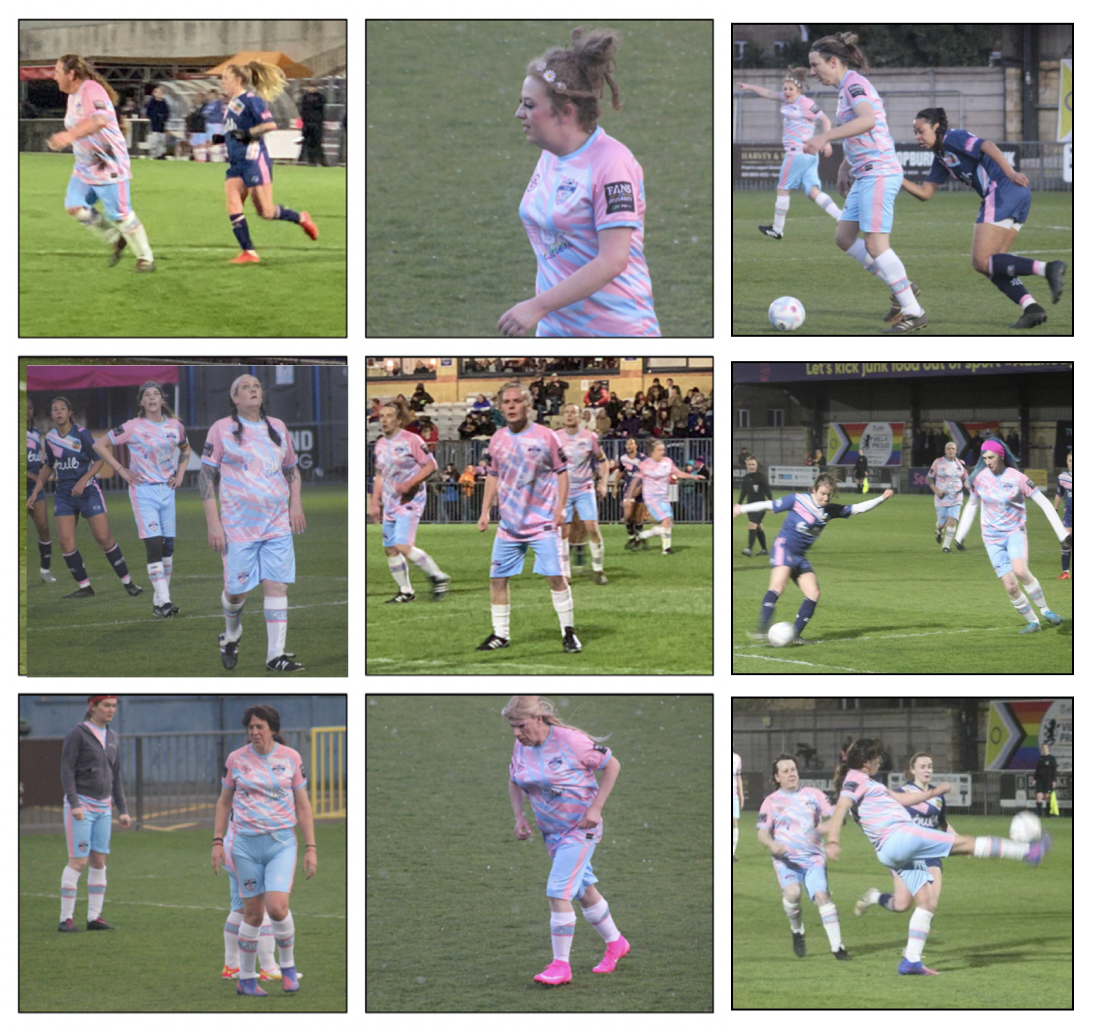
Like Winston, blinking at the fingers, I tried to see a pitch full of women, but I just couldn’t. Because that isn’t what I was looking at.
Either a man can become a woman or he can’t. We can probably all agree that a man doesn’t become a woman by putting on a wig and a bra, so how does he do it? The problematic nature of this question has led to the more fashionable idea that such a man was always a woman, although that raises the questions ‘then what is he transitioning to?’ and ‘how?’ Which brings us back to the wig and a bra, and possibly even the dishwasher, and the question ‘what is a woman?’.
If it’s an inner feeling, of course, any bloke can become a woman. Just ask the Germans. They’ve recently announced that from next season, “transgender, intersex, and non-binary players” can choose which teams they want to play on. Some will say once a man says he’s a woman, it means he was always a woman.
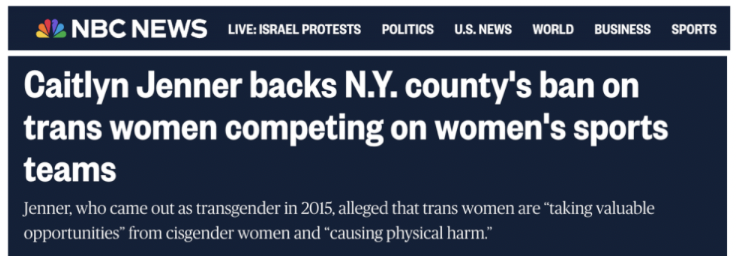 Some people even claim Bruce Jenner was always a woman, although Jenner himself says otherwise, and has become an unlikely ally in the battle against men in women’s sports, stating in 2015 that he believed “trans women are “taking valuable opportunities” from women and “causing physical harm.”
Some people even claim Bruce Jenner was always a woman, although Jenner himself says otherwise, and has become an unlikely ally in the battle against men in women’s sports, stating in 2015 that he believed “trans women are “taking valuable opportunities” from women and “causing physical harm.”
The whole thing is clearly so absurd that there is only one way to make it seem less so. The key word, the key concept, that of ‘sex’, must be removed altogether. Once we start talking about gender, ethereal, ectoplasmic and ever elusive gender, we leap into the realms of philosophy and we can pretend that maybe we meant gender when we said sex all along. In the realms of philosophy everything and nothing makes sense.
The Stunning & the Brave
 “Football is for everyone!” trills Pippa Henry, who used to play on the bloke’s side, transitioned in his late forties, and now plays with the Cheshire ladies team.
“Football is for everyone!” trills Pippa Henry, who used to play on the bloke’s side, transitioned in his late forties, and now plays with the Cheshire ladies team.
Look, everyone thinks this is super. Of course they do, they would be shamed and cancelled if they objected to this old-enough-to-be-their-dad geezer joining in. Look at all those happy, smiling faces!
“I love my football and obviously I can’t play male football anymore, because I’m a woman.” says Henry, whose new job is to ‘help support and educate people’ as a trans community champion for Cheshire FA.
Don’t confuse him with Pippa York, though. He’s busy invading women’s cycling.

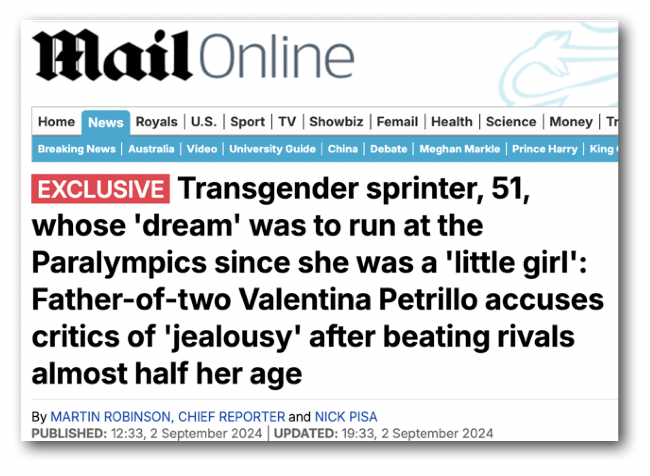 Because of course, this goes way, way beyond football. As I write, another man, partially-sighted Valentina Petrillo, is taking part in women’s Paralympics running events. There is an excellent thread about Petrillo here from @brandubh4 Before declaring himself a woman, he won nearly a dozen national men’s titles. He has fathered two children. He transitioned aged 45, and this week claims it has been his dream to win a medal at the Olympics ‘since I was a little girl’. In what universe is this not taking the piss? In 2020, he won three gold Paralympic medals by running ‘as a woman’. Who knows what the women ousted by these men might have achieved?
Because of course, this goes way, way beyond football. As I write, another man, partially-sighted Valentina Petrillo, is taking part in women’s Paralympics running events. There is an excellent thread about Petrillo here from @brandubh4 Before declaring himself a woman, he won nearly a dozen national men’s titles. He has fathered two children. He transitioned aged 45, and this week claims it has been his dream to win a medal at the Olympics ‘since I was a little girl’. In what universe is this not taking the piss? In 2020, he won three gold Paralympic medals by running ‘as a woman’. Who knows what the women ousted by these men might have achieved?
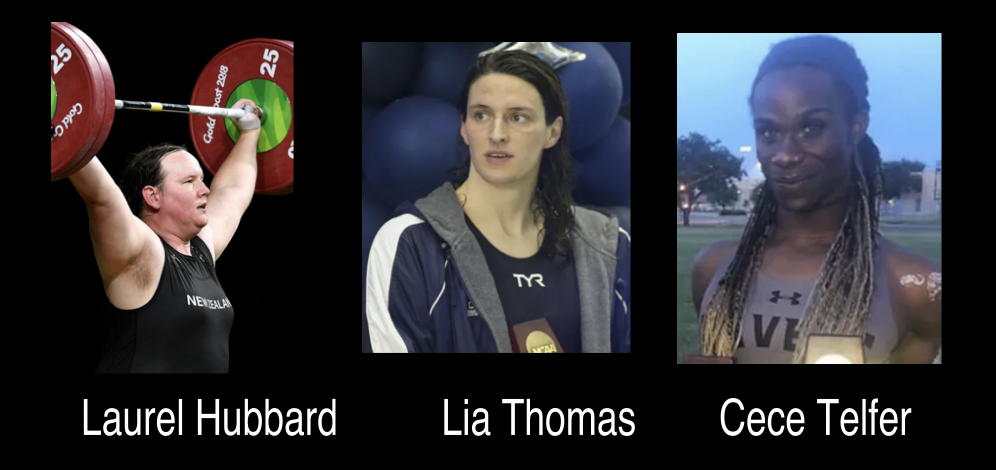
We all remember Laurel Hubbard, from the last Olympics, and his ‘whoops I dropped it’ performance. Or did he? Who cares, he shouldn’t have been there anyway. Veronica Ivy (cycling), Lia Thomas (swimming) Fallon Fox (boxing) Cece Telfer, Andreya Yearwood (running) Lana Lawless (golf)… I could go on and produce a more lengthy impressive list, but all of these men have brazenly taken medals and prizes from women: we already know it’s happening. Not to mention the boys and men taking places from girls and women in local sports teams, and even affecting ‘fun’ local events like Parkrun. In 2023 a research paper by Policy Exchange found that at least three Parkrun female records were held by men as a result of its policy of allowing entrants to ‘self-identify their gender’.
Olympian Mara Yamauchi claimed that after one women’s record was ‘smashed to smithereens’ it meant that the record was “probably now out of female hands forever”.
It isn’t just about the Olympics. It isn’t just about football. It’s everywhere.
“Today, even when backing one’s feelings with scientific data on how male bodies have physical advantages over female bodies, it’s forbidden to say anything out loud about how they should not be allowed to compete in divisions carved out for women in girls. If you say anything the response is almost always a straw man argument “if you don’t want male bodies in sports you want to erase trans existence” is the most common rebuttal.” sportswoman Tiffany told WOLF in 2023
Returning to football, because that’s where we started, another bloke who deserves a quick mention is Giulia Valentino. He played in the Ladies Gaelic Football Junior J Shield tournament in 2022 on behalf of Na Gaeil Aeracha. This struck people as particularly weird as he is clearly neither a junior nor a lady.
 Nonetheless, following the great and growing tradition of men determined to shamelessly nuzzle their way into women’s football, there he was. And here he is. And if you’re wondering why the young woman in blue is holding the ball – that’s Gaelic Football for you, a game more like rugby than football.
Nonetheless, following the great and growing tradition of men determined to shamelessly nuzzle their way into women’s football, there he was. And here he is. And if you’re wondering why the young woman in blue is holding the ball – that’s Gaelic Football for you, a game more like rugby than football.
When he’s not playing football with ‘junior’ women, the fragrant Giulia is DJing at a fetish club in Dublin or posting pictures of himself pole dancing, or tied up on a bed in what looks like his mum’s spare room in a pair of rather grotty looking underpants. (I spared you that one).
What is going to happen to women’s sports? How long before all the women’s sporting records are broken and held by men? Will those records ever be ‘cancelled’ and replaced by the achievements of actual women, or is it already too late?
As I finish this piece up, I hear that yesterday’s football match in Sutton, featuring Blair Hamilton, was postponed with just a few hours notice.The Daily Mail reported “The game, which had been scheduled to kick-off at 2pm, was called off after Sutton sent an email to their opponents at 11.12am informing them of their inability to field a team.”
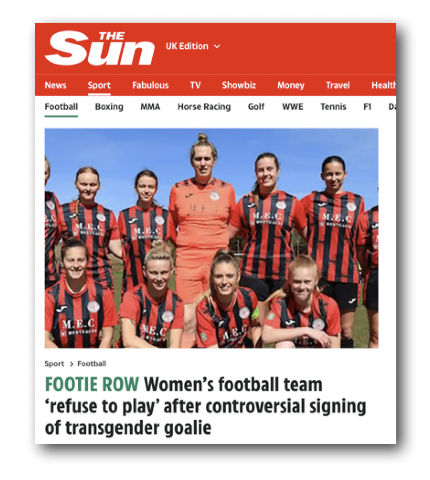 In unconfirmed speculation, the Mail added “it is thought that Sunday’s game may have been postponed after some of Hamilton’s team-mates refused to play in protest at her signing.”
In unconfirmed speculation, the Mail added “it is thought that Sunday’s game may have been postponed after some of Hamilton’s team-mates refused to play in protest at her signing.”
The Sun (also not known for its reliability) made the same claim. I know a lot of women are hoping that’s the case. But I find it unlikely. Women are being held to ransom over this. If you call a man a man, you’re a bigot. Remember those happy smiling faces? Be kind.
Or else the man will be very, very sad and angry and you will probably never play your favourite sport again.
I have friends in Sutton, lovely, caring, hippy friends. If I asked them what they thought about all this they would look shocked and say it was terribly transphobic and tell me to ‘be kind’ and that these men are just being their ‘authentic selves’. Because the reality of men in women’s sports is so insanely unreasonable and unfair, and almost impossible to conceive, that most people find it easier just not to think about it.
Try making sense of this, for example.

The German football federation explains its policy (starting season 23) of allowing selfID on football teams.
“…transgender players who can now switch at a self-determined time or remain initially in the team in which they’d been playing previously,” the DFB said. “As long as the sporting activity does not affect the health of the person while they are taking medication, the person can take part in the game, which is why the new regulation excludes doping relevance.”
So that all makes sense then.
A smug man and a concerted woman express their feelings about it here.
“I used to play for a male team,” says Charlie.”The Berlin officials announced a new rule that trans people are allowed to play in whatever team they want. They can choose. That new rule was just totally necessary… now we know that we can decide”
Ana says “It is the beginning of the end of the female athlete. There is a clear difference between a female body and a male body. Of course we are not going to say ‘you cannot feel this way’ but in reality we all play with our bodies and not how we feel”
Nicholas ‘Laura’ Holstein

One lovely lady to have benefited from the new policy is the fragrant Nicholas ‘Laura’ Holstein who claims to be non-binary but has been allowed to play on women’s football teams since 2023.
Genvieve Gluck writes in Reduxx of how Nicholas has shown his gratitude to women everywhere by taking legal action against a woman’s gym for not allowing him access to their showers. He’s already received $1,000 but now wants more.
“I’m just a woman who looks different,” he says.
Yeah, right, and I’m a bloody aubergine.
POST SCRIPT 5/9/24
Doing Sweet FA to stand up for women’s football

And finally back to England, where one father has told of howe his daughter felt ‘massively intimidated’ facing Blair Hamilton in a game.
“It’s just not right. I wish more people would speak up,” he said.
“Sutton insisted that they had followed the protocols laid down by the Football Association, which controversially allows those born male to self-identify into the women’s game.” reports Oliver Brown in the Telegraph.
And this raises a really important question.
Are there any clubs that have tried to say ‘no’ to this crazy ruling, or will they be excluded from membership of the FA, or playing on FA grounds, if they do?
Are all FA Women’s clubs now obliged to accept any bloke who fancies playing with them?
It seems that may indeed be the case.

Pingback: "He's a man": protest at Wembley in support of girl sanctioned for calling a man a man -Lily Maynard